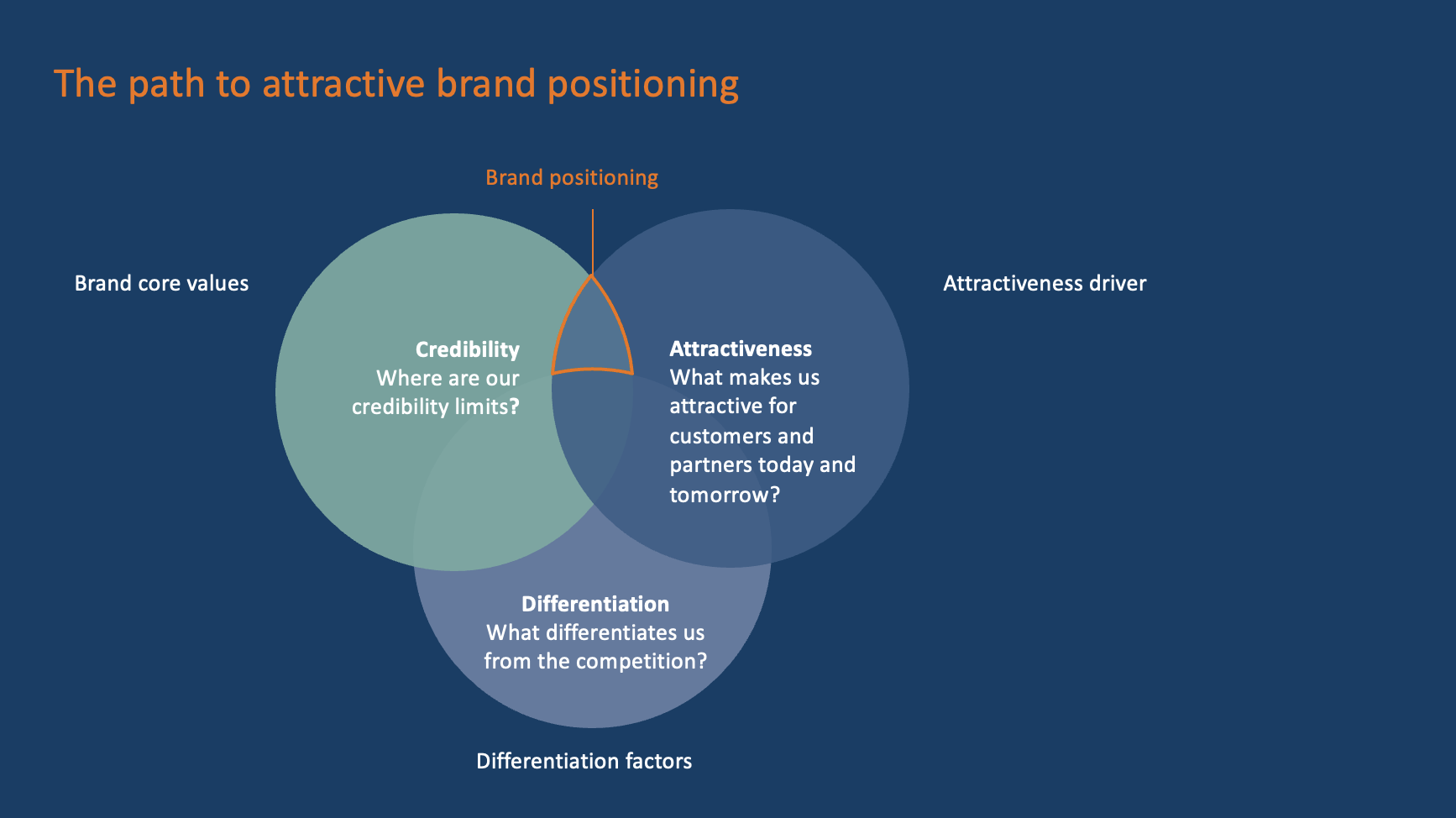Glossary
B2B-Brand
B2B-Brand
B2B-Brand

The term Business-to-Business brand (abbreviated: B2B brand or B-to-B brand) describes brands for industrial and capital goods, machines for instance.
Unlike a Business-to-Consumer brand (B2C brand), the brand's target group is not the end consumer but companies of the processing industry (with a few exceptions, for example Intel). Some of the best-known types of B2B brands are company brands such as Hilti, Festo, Siemens, General Electric, or IBM. Countless technology brands are B2B brands, as are so-called ingredient brands like Intel or GORE: They try to convey their relevance for the end customer across value chains. Such brands sell their products to processing enterprises which in turn advertise that they integrate these brands in their products ("Intel Inside"). The goal is to make the product more attractive.
Because negotiations in the B2B segment are primarily with purchasers or corporate buyers, it is often assumed that decisions are made mainly on the basis of price. However, various studies – among them the first study examining brand management in the B2B sector – have shown that buyers indeed apply other purchasing criteria: security, simplicity, and their personal relationship with the seller.
Sellers often underestimate the security function of a brand. As a consequence, brand management was considered to be an unnecessary management discipline in the B2B sector right into the new millennium. Even today, a number of preconceptions still persist that hamper brand management in the B2B environment. The most common of these are:
- Preconception 1: Brand management is the same as marketing. It is implemented by the marketing department or advertising agencies.
- Preconception 2: A good product sells itself, so it doesn't need a brand.
- Preconception3: Function and facts are the decisive criteria for purchasing decisions.
Because of increased competition (for instance from foreign providers), market saturation, and increasing price pressure, more and more B2B companies are realizing that the brand plays a major part in the organization's success and therefore strive to engage in professional and systematic brand management.
Our recommendation:
Study: What is important to B2B customers in making purchasing decisions?
Study: How resilient are German technology brands?
Book: Value Branding: Vom hochwertigen Produkt zur wertvollen Marke
B2C-Brand
B2C-Brand
B2C-Brand

The term Business-to-Consumer brand (abbreviated: B-to-C brand or B2C brand) describes products and services that are sold by companies directly to the end customer.
In the past, B2C brands were characterized by nice design and huge budgets for online and offline advertising – but little content. However, saturated markets, increasing transparency, and social insecurity made customers more skeptical and at the same time more demanding.
These days, the success of B2C brands no longer depends on winning discount battles with interchangeable products. Brand success now relies on clear differentiation from the competition, high brand attractiveness for consumers, and building trust for long-term customer loyalty.
The foundation for these success factors: at the very least reliable peak performance and an understanding of consumers that reaches beyond merely satisfying obvious needs.
In our highly developed, individualized, and globalized world, people try to give meaning to every moment of their lives. This opens up new consumer markets and new potential for brands, their relevance, and their values. It is essential to understand: The B2C brand is less and less an expression of what the customer is but rather of what he wants to be.
Digital business models offer B2C brands a new kind of customer relationship. Constant dialog with the customer at the various brand touchpoints helps brand managers find out what customers expect and, ideally, to exceed these expectations. This results in successful customer retention and a high recommendation rate, as well as clear differentiation through the brand.
Our recommendation:
Book: Brand Future – praktisches Markenwissen für die Marktführer von morgen
Study: Swiss brands strengthen resilience in turbulent times
Beverage Brands
Beverage Brands
Beverage Brands

The beverage industry – with its product range from soft drinks to milk and all the way to wines – is constantly trying to win customers with countless nearly identical products and to influence the customer's willingness to buy more at higher prices. Nearly all beverage producers suffer from the same problem: The surplus in the market. This is why only very few dairies can sell milk for more than €1 per liter, and the average price for a bottle of white wine in Austria is only about €3.50.
Nevertheless, there are some players in the market who manage to achieve a significant price and volume premium: Weihenstephan, Red Bull, and Coca-Cola, for instance. This success is only partially due to the taste of the products, which is regularly evidenced in blind taste tests. The real reason is: These beverage producers have evolved over the years into not merely well-known but also attractive brands.
How do you become a valuable beverage brand? Certainly not through superficial marketing – colorful campaigns, creative slogans, or a new logo – but by conveying values that are based on performance and through clear positioning in the market. Coca-Cola stands for "joy", Red Bull represents "boundless freedom", which the company repeatedly proves through athletic performance. With their clear direction, these beverage brands give their consumers orientation amid the overabundance, and also provide an additional benefit beyond the product, for which customers are willing to pay more.
Accordingly, successful beverage brands are performance batteries. Customers associate them with positive preconceptions and are thus willing to buy at higher prices. It follows that beverage brands are value drivers for the producers - and for customers they are beacons giving direction amid excess.
Bluewashing
Bluewashing
Bluewashing

With "bluewashing", a company wrongly presents itself as an organization that assumes social responsibility and acts ethically.
What bluewashing and greenwashing have in common
Both bluewashing and the somewhat better-known greenwashing are used to deceive. With greenwashing, a company pretends to be committed to environmental protection and sustainability. Both terms are based on the English word for whitewashing.
How bluewashing works
Bluewashing is when a company overemphasizes or even invents social activities in its communication. In other words, they are not part of a brand's services and merely demonstrate a "false sense of depth". Nevertheless, some companies try to polish up their brand image with bluewashing.
The color blue in the term bluewashing refers to the blue in the flag of the United Nations, which is committed to peace and security worldwide. The aim of its so-called United Nations Global Compact (UNGC or GC) is to promote ten principles for human rights, labor standards, environmental protection and anti-corruption.
Brands that participate in this UN initiative are only obliged to report. They can therefore adorn themselves with the associated blue emblem, even if they do not actually integrate and implement the required values.
As a result, some companies misuse their membership for purely promotional purposes and use the UNGC logo as an inexpensive PR and CSR tool.
How to recognize a brand that is bluewashing
- The brand refers exclusively to its membership in the UNGC and not to other trustworthy or legally protected labels, quality marks and seals that signal social responsibility.
- It does not present any specific details about its projects. Information on financing is also missing.
- The brand alone emphasizes its social responsibility and lacks independent information and evidence.
- There are critical reports that contradict the brand's self-portrayal. External and brand communication do not match.
Communicate credibly: How brands show genuine social commitment
Any credible communication needs an honest commitment as a basis: to this end, the management takes a serious look at the corporate responsibility of its brand. It determines a focus that should shape the future of the brand - in the long term.
With this focus, suitable social measures are then identified, implemented and communicated responsibly. A clearly defined corporate social responsibility strategy (CSR strategy) is also suitable for selecting a suitable commitment.
Management should determine which aspect of the brand positioning is the most sensible starting point. Through this, social commitment contributes significantly to a credible brand image.
The decision for or against a measure can be very emotionally challenging, the possibilities seem endless. Without a clear brand strategy, it is very difficult to make the right choice.
Find out more here:
Brand
Brand
Brand

Brands are the condensed expression of corporate peak performances. Attractive and successful brands know who they are and what performances they deliver, and conduct all their activities accordingly. They concentrate on those things that fit their personalities and correspond to their talents and strengths. Successful brands do what they do better than anyone else – consistently.
When a company provides performances at consistent quality over a long period of time, these performances eventually settle into brand values. The difference: While performance has to be proven over and over again, values are believed.
Only when a brand condenses and communicates the identified peak performances can it release the energy it gains by recharging with consistently delivered peak performances. Thanks to this brand energy, consumers recognize brands within a fraction of a second. All it takes is a glimpse of the brand logo or the sound of the brand name. Ideally, the brand conveys trust, security, and simplicity – and thus influences the customer's decision in favor of the brand.
Brands are more than mere designations of the origin of a product or service. They evoke emotions, keep promises, and give the customer orientation for his purchasing decision. Brands allow companies to use this effect for sustainably high results.
This is what brands are not: Logo, design, or advertising. Brands are also not a pure communication instrument, but an economic asset: This is why the brand has no business in the marketing department but is first and foremost a management responsibility.
Our recommendation:
Book: No. 1 Brands –Die Erfolgsgeheimnisse starker Marken
Book: GOOD Business – das Denken der Gewinner von morgen
Book: Value Branding –Vom hochwertigen Produkt zur wertvollen Marke
Book: Was Marken unwiderstehlich macht - 101 Wege zur Begehrlichkeit
Book: Reiz ist geil – in 7 Schritten zur attraktiven Marke
Book: Brand Future – praktisches Markenwissen für die Marktführer von morgen
Brand Activation
Brand Activation
Brand Activation

The term brand activation describes a targeted impulse designed to help a brand gain new attention and strength.
Why brand activation can be necessary
The purpose of brand activation is to counteract increasing weakness or stagnation of a brand. It is intended to make the brand more attractive again for the relevant target groups and to increase awareness of the brand among those groups. As a rule, this is achieved with creative communication and experiences, designed to breathe fresh life into the brand.
Many brands lose attractiveness over time. Telltale signs are:
• Lack of credibility
• Drop in recommendation rate
• Customer dissatisfaction
• Indistinct differentiation from the competition
• Lack of awareness of the significance of the brand within the company
The central purpose of brand activation, then, is to give the brand new luster. It is intended to stimulate interaction at existing or new brand touchpoints.
How to conduct a brand activation
Brand activation should be seen as a jump start for making the brand more meaningful to its target groups again.
There are different approaches for running a successful brand activation. What is important is that the chosen communication and channels clearly match the brand DNA. Brand activation often takes the form of creative campaigns or brand experiences.
Example brand activation Porsche
The origin of the Porsche brand lies in the fulfilment of a dream. In late 2021, the sports car maker ran a global campaign called "Global Gallery" that was true to this original thought and yet completely new. This was a brand activation measure to make Porsche more attractive to new target groups.
The underlying theme of the campaign is that of life-long dreams. On out-of-home advertising spaces in 5 cities, Porsche shows the works of digital artists. The auto maker collaborated on the campaign with König – one of the leading galleries for contemporary and digital art. The ad spaces turned into digital canvases for sculptures and other NFT artworks, which can be purchased directly with QR codes.
Porsche not only reached a large target group with its campaign, but also recharged its brand in a new way. Making dreams come true was reinterpreted for Porsche and let the brand shine with new radiance.
Do you have any questions or suggestions regarding this article? Then we look forward to receiving your e-mail.
Brand Ambassador/ Corporate Influencer
Brand Ambassador/ Corporate Influencer
Brand Ambassador/ Corporate Influencer

Brand ambassadors may be employees of a company or enthusiastic customers of a brand.
Employees become brand ambassadors when they are proud of their employer and willingly communicate that pride. When it's time for a shift change at Porsche in Zuffenhausen, nearly all employees wear their clearly recognizable Porsche work clothes on their way home: Their enthusiasm for the brand and their pride to be part of this brand makes them brand ambassadors.
There are brand ambassadors among customers as well – at least for highly attractive and inspiring brands. They identify strongly with the brand and are characterized by passion and loyalty to the product or company. A well-known example is the long line in front of Apple stores every time a new iPhone is released.
Such brand fans also act as brand ambassadors because they communicate their enthusiasm for the brand in their social environment. This is an extraordinary added value effect: Recommendations of a brand from the mouth of a friend or family member are many times more credible and convincing than any form of advertising.
Strong brands therefore take care of their brand ambassadors, provide them for instance with advance information on new products, or invite them to brand events – always for the purpose of intensifying the positive viral effect and increasing brand attractiveness.
Our recommendation:
Book: No. 1 Brands : Die Erfolgsgeheimnisse starker Marken
Book: Value Branding: The first textbook for technology brands
Brand Analysis
Brand Analysis
Brand Analysis

The brand analysis is conducted at the outset of a brand (strategy) process. It forms the basis for the subsequent brand strategy, which builds on the results of the analysis. It examines current and historic content and performances of the brand (brand inventory), and also looks at the brand's style – current and retroactively (brand exventory).
The objective is to identify and condense the brand's countless peak performances (brand core values) and ultimately express them in condensed form through the brand positioning and the brand stylistics in an unmistakable, inimitable, and credible way using the entire marketing mix toolbox. This is how performances are perceived by the customer, remembered, recommended, and appreciated.
Brand Architecture
Brand Architecture
Brand Architecture

The brand architecture defines the hierarchical structure of the brand portfolio and its web of relationships. In addition, the brand architecture determines the relationships between individual brands – meaning their roles and positionings within the company as well as the boundaries and interfaces between the various business segments and products.
The aim of the brand architecture is to clearly emphasize the relevance and unique selling propositions of the brands and to establish an assertive order of corporate, assortment, or product brands for each market or segment.
Hierarchically, an umbrella brand generally stands above a pool of various sub-brands aligned with products or segments. This structure not only gives companies a better overview and easier management of their brands, but also offers distinct cost savings in communication.
See also Single brand strategy and Multi-brand strategy
Brand Attractiveness
Brand Attractiveness
Brand Attractiveness

Brand attractiveness manifests in a brand's ability to attract customers and in the customer's willingness to buy. Its level correlates to the brand's success potential. It is, however, independent of the brand's degree of awareness.
The brand attractiveness perceived by the customer is expressed in positive associations or in the quality of the brand relationship. It creates conation effects that are beneficial to a company's profitability:
1. The price premium increases: Customers are willing to pay more for an attractive brand than for a technically and functionally equivalent product.
2. Cross-selling readiness increases: In addition to the primarily product, the purchase process extends to include other products of the same brand. This cross-selling increases sales efficiency and turnover per capita.
3. The recommendation rate increases: The customer is motivated to recommend the brand to others (word-of-mouth). This way, the company benefits from the credibility of others, which is rated higher than the company's brand communication.
4. Customer loyalty is strengthened: Customers feel an inner connection with the brand, their values overlap with those of the brand. Even after a negative experience, the customer does not abandon the brand and the company can continue to benefit from the "Customer Lifetime Value".
Our recommendation:
Book: No. 1 Brands - Die Erfolgsgeheimnisse starker Marken
Book: 101 Triggers to Boost Your Brand
Book: Reiz ist geil – in 7 Schritten zur attraktiven Marke
Brand Awareness
Brand Awareness
Brand Awareness

Every one of us is confronted with about 3,000 brand touchpoints every day. Which of them do we remember? In order to determine the degree of brand awareness, we find out what percentage of people remembers it.
There are two different methods for doing this:
- Unsupported measurement of brand awareness (brand recall): We find out whether consumers remember the brand and can name it without any prompting ("When you think of cars, what brands can you name off the top of your head?").
- Supported measurement of brand awareness (brand recognition): We research whether consumers remember the brand in so-called "recognition tests". In this method, they are given memory aides, such as a list of different brand names ("Which of these brands do you know?") or a visual of brand style elements.
What is the difference between brand awareness and brand attractiveness?
Awareness – particularly in saturated markets full of interchangeable products – is only a prerequisite for the next, more important level: brand attractiveness. Because: Just because a brand is well known, that doesn't necessarily mean it is desired. BrandTrust's 10th conviction is therefore: Attractiveness beats awareness.
Conversely, the attractiveness of a brand does not say anything about its awareness. An example for this are niche products that only address a specific target group and – even with a high level of attractiveness – can only achieve low awareness levels.
The pure awareness level of a brand can be increased with monetary means like classic advertising, events, or sponsoring. But in a world of overabundance, it is desirability that determines a buying decision. This is why, from a brand strategic point of view, increasing brand awareness should be a consequence of the brand's attractiveness (https://www.brand-trust.de/de/glossar/markenattraktivitaet.php) in order to inspire people and keep them loyal in the long term.
Brand Building
Brand Building
Brand Building

The term describes the development and evolution of the content and style of a brand. Its goal is to increase the attractiveness and desirability of the brand, so it can make the greatest possible contribution to the company's success.
Brand building is a long-term process, which – depending on the brand's initial situation – usually takes five to ten years. The reason for this is the "human system", where changes of behavior and attitude happen very slowly.
The success of brand building depends on the consistency and assertiveness of the communicated performances and messages. This concerns all touchpoints between the brand and the key target groups, mainly customers and employees.
Brand building should be supported by a brand strategy and a strategic brand positioning.
Brand Communication
Brand Communication
Brand Communication

The value of a brand rises and falls with its communication. Even strong brands have to communicate their values to be perceived by consumers and sell.
Successful brand communication has two clinchers: Enthusiastic customers and satisfied employees. As recently as ten years ago, companies created their own realities with advertising and PR - today, employees and customers define the reality and reputation of a brand name company. They talk to others about their experience with the company and its products around the clock.
Trust is the greatest asset in all this: It only arises when the customer has a consistent, credible brand experience at all brand touchpoints. Consistent brand touchpoint management is therefore an important control tool of brand communication.
But the best lever for earning the customer's trust are a company's employees, when they act as (trained) brand ambassadors, and credibly live and communicate the brand values and brand positioning. This can be clearly illustrated by using the Apple brand as an example: The term "APPLE" is used internally as an abbreviation for "approach, probe, present, listen, end" – meaning "approaching" the customer, "probing" him about what he wants, "presenting" a solution, "listening " to feedback, and "ending" the conversation with a heartfelt invitation to come back.
So-called "context-based" brand communication has increasingly emerged as a key to success in the digital media world: Proving the relevance of brand messages by systematically aligning them with the context. Companies use targeting techniques for approaching target groups to accomplish this.
Our recommendation:
Buch: No. 1 Brands – Die Erfolgsgeheimnisse starker Marken
Brand Community
Brand Community
Brand Community

The term brand community describes a fan community centered around a brand. It develops when people feel a strong connection with a brand or other brand users.
How is a brand community structured?
The brand forms the core of this community, it is the basis of the relationships that develop there. Apart from mere interest, the community members are often deeply knowledgeable about the brand.
Typical characteristics of a brand community are:
• Shared rituals, symbols, and traditions
• Moral responsibility for other members
• Repeated telling of personal brand experiences
A brand community is not limited to any geographic location. It can be physical or virtual (or a combination of both). The intensity of the connection can also vary: It can range from simple, indirect exchanges to regular, organized meetings. These interactions are the drivers of a brand community, they determine its strength and significance.
Importance for brand management
In the context of brand management, communities are considered a success factor that is becoming increasingly important. The brand loyalty that is cultivated in brand communities, as well as the exchanges that can amount to (free) advertising, have a positive effect on a company's success. Brand companies can get actively involved in shaping their brand communities, for instance by providing exciting incentives or relevant content.
The aim of brand management is to gain community members to increase brand acceptance and long-term customer loyalty.
Examples of brand communities:
• Apple
• Harley-Davidson
• Lego
• Db
Do you have any questions or suggestions regarding this article? Then we look forward to receiving your e-mail.
Brand Consultant
Brand Consultant
Brand Consultant

Brand consultants help people to appreciate the performance of a brand, and to see it in a new light. They contribute their expertise and experience in working with the client to develop, manage, and evaluate a successful brand. The task starts at the strategic interface between corporate management and marketing.
Brand consultants and brand managers treat a brand like an economic asset that has a lasting impact on the company's development. Experiences and insights gained in this context lead to convictions that are the basis for individual brand development and brand management.
Upstream of marketing efforts, brand consultants enable their clients to develop a strategic brand positioning. Marketing subsequently has to transfer this positioning and the brand messages to every brand touchpoint, so that they can be perceived by the consumer. Advertising measures, agency work, and market research are separate issues and are not part of a brand consultant's responsibilities.
Brand consultants see brands as powerful living systems that ensure a company's economic success, so they have to be consistently developed and managed. Brand strategy and brand management are therefore the responsibility of top management – the brand development on the other hand must be handled by a heterogeneous team.
This interactivity covers all performances of the brand. It is how a successful brand is developed from the inside out, a brand that is credible, attractive, and positioned differently from the competition. With tried-and-true coaching and guidance methods, brand consultants enable individuals or entire departments to live the brand core values in their everyday work and to disseminate them proudly, internally as well as externally.
Our recommendation:
Brand Consulting
Brand Consulting
Brand Consulting

There is a plethora of definitions for this term. In particular the marketing environment tends to reduce brand consulting to short term, literally superficial measures such as advertising or the design of brand logos.
Classic brand consulting, however, acts at the strategic interface between corporate management and marketing. BrandTrust, for instance, defines its services as brand-centric corporate management.
In that sense, brand consulting means helping clients to orient their entire organizations toward delivering and marketing their performances in a credible and attractive fashion and to differentiate them from the competition.
Brand Cooperation
Brand Cooperation
Brand Cooperation

When two or more brands join forces – even temporarily – to benefit from each other's brand strength for purposes of product development, brand activations, or in their brand communication, we call it brand cooperation.
Brand cooperation is used frequently and quite ingeniously in the luxury segment. The interior of a Bentley, for instance, sports a Breitling analog clock integrated in its dashboard. Despite their different sectors, the two brands fit together well and together create added value. Both luxury brands are status symbols of conspicuous luxury and are among the most expensive brands of their respective sectors. They embody similar or identical values: elegance, technology, and performance. And they address customers who are attracted to these values.
From a brand strategic perspective, it is important for brand cooperation to check that the brand values fit in terms of three categories: product development, brand activation, and brand communication. Otherwise, both brands stand to lose attractiveness. For example, the shiny Breitling clock on the dashboard of the "sensible" city automobile brand Smart would have a completely different (probably negative) effect.
If the values of the cooperating brands are a good fit and the brand positionings are compatible, the customer can benefit from added value that is generated by the interplay of the brands – and that none of the brands involved can generate individually. This results in increased brand attractiveness for the individual brands and fosters loyalty of brand fans, who keep buying the brand repeatedly, recommend it, and pay more, sustainably stimulating the company's growth.
Brand Core
Brand Core
Brand Core

Talents and performances of a brand condense over time into specific brand core values. Taken together, these brand core values form the brand core, which describes its specific character, its DNA.
Every brand core is unique in the composition of its values. It can only be seen in its entirety, and outlines the brand's credibility limits:
- Everything that fits the brand core values of a brand is credible, because it is supported by demonstrable peak performances (within the credibility framework).
- Everything that contradicts the brand core values is not credible, because it is not supported by demonstrable peak performances (outside of the credibility framework).
In detail
- Brand core values are the essence of what makes a brand unique, superior, special, differentiated, valuable, and successful.
- Together with the brand stylistics, the brand core makes up the personality of a brand.
- A brand core serves to differentiate from competing brands and forms the basis of all brand activities. It is therefore a significant investment for the company.
- The brand core provides a clear sense of identity as a prerequisite for consistent behavior of all employees.
- The brand core values must be recognizable in everything the brand does and at all brand touchpoints without being communicated verbally. The brand core values are thus a legacy and at the same time an obligation for the future.
Brand Culture / Company Culture
Brand Culture / Company Culture
Brand Culture / Company Culture

A brand culture is a type of company culture that is completely aligned with a brand (organization culture). It shapes the actions and decisions of all members of an organization. Thus, the brand culture impacts the entire management and employee leadership cycle. When a company uses the brand culture as its central management system, it benefits from long-term advantages.
What is a brand culture based on? The foundations
A brand culture is a brand-centric company or organization culture. It is rooted in the brand identity, which consists of shared values and a Vision.
The brand core values also play a crucial part: They are the very heart of every brand—and therefore the core of every strong company culture. These values define the right action framework for relationships, communication and employee performances.
But we don't mean social or ethical values.Nor are we talking about wishful thinking about how a company would like to be perceived. Also, these values are not instruments for solving problems with the way people work together and make decisions.
Brand core values are what defines, characterizes and specifies a company. They arise from peak performances the company has delivered over a long period of time. These are performances the company is proud of and identifies with. Such performances stir emotions and are not questioned—they are simply believed. This firm belief is the foundation of a company's brand identity.
So we see, every company culture is rooted in condensed peak performances, whether consciously or subconsciously. However, it is essential for the company to know its own special performances and align its actions accordingly. They shape its characteristics, specifics and success factors.
Apart from the peak performances, a company's vision also provides orientation and clarity, as long as that vision differentiates the company from the competition and is attractive to all relevant stakeholders.
Brand Culture is a management system
All these foundations give rise to a brand culture. Correctly understood, it is a management system that tells all those involved who they are and how to act. In short: how to behave in line with the brand.
What that means in detail:
- All involved know the company's values and strategic direction and align their decisions with them.
- People identify with the values and/or the vision of the company. Brand-conform behavior is ranked above the functional and the individual.
- The management staff live by the values and expect the same of their employees.
- Employees and potential applicants are compelled and inspired; they stay with the company long-term.
Brand core values are more than just empty phrases to print on posters and brochures for effect. They are a central control element for the entire management and employee leadership cycle: from strategy development to company processes, from innovation design to sales, from onboarding to offboarding, from analog to digital.
The result is brand-conform behavior that is lived and expressed subconsciously. All involved have the necessary understanding of their company's vision and identify with it.
Because the company culture has a profound impact on all areas of a business, it should never be considered separately from strategic developments. Otherwise, what Peter Drucker warned about will happen: "Culture eats strategy for breakfast."
The benefits of a brand culture
In such a culture, it is not monetary but value-based incentives that count.
A company benefits permanently from a brand culture that reflects its brand one hundred percent: It remains stable through management changes, attracts the right employees and retains them. Its competitive edge improves, customers become fans. In addition, the brand culture ensures that the company does not pursue every new trend that comes along.
Such a culture is the result of learning together (Edgar Schein, 2018). It makes management decisions more transparent, makes relationships between employees more stable, increases the trust of all stakeholders and makes the company more attractive to the desired target groups. It makes family businesses inheritable.
A brand culture makes an organization successful long-term.
Do you have any questions or suggestions regarding this article? Then we look forward to receiving your e-mail.
Brand Damage
Brand Damage
Brand Damage

When a brand does not consistently live up to its promises and its attractiveness suffers in consequence, we talk about brand damage. In the long run, brand damage leads to loss of brand loyalty and brand trust. In the worst case, the company loses market share and ultimately has to close.
Scandals or bad decisions – as long as they are short lived or only happen once – have little impact on brand attractiveness, because consumers usually forgive such missteps and the brand does not suffer damage.
Brand damage can be caused by external factors (such as sabotage or intentional misinformation) or internal factors. The latter is the case when the communication of brand values is not coherent or a company makes strategic mistakes.
- Abercrombie & Fitch: The desirability of the fashion brand developed in Europe because the clothing items were considered souvenirs from the United States. The label's expansion by opening numerous outlets in larger cities disabled this brand element, and desirability declined. The fact that the stores preferred to hire young and attractive employees caused considerable public indignation. The decision not to offer plus sizes also earned the company harsh criticism.
- Deutsche Bank: Scandals revolving around money laundering and embezzlement caused the bank substantial damage.
- AirBerlin: The airline's brand suffered a total loss. The attempt by management to make the vacation airline also appeal to business travelers and go toe-to-toe with competitors like Lufthansa was out of character. Lots of cancelled flights without compensation exacerbated the situation. The airline's insolvency and the death of the brand were inevitable.
Brand Design
Brand Design
Brand Design

The term brand design describes the contemporary implementation of the brand style elements. It provides creative expression and keeps the brand up-to-date.
The difference between brand design and brand style: While brand design is short-lived, brand style refers to the fundamental appearance of a brand and is characterized by predictability and continuity.
Metaphorically speaking, the brand style decides whether the gentleman wears a tie or not. The brand design determines what color the tie should be. One example of the modern adaptation of brand design is the fox of the building association Schwäbisch Hall: The basic style elements have remained in place, only the look of the fox has changed over the years.
Brands with larger product portfolios also take advantage of the freedom of brand design. Take for instance the kidney grille in BMW's automotive design: The kidney on a 3-series BMW looks different than that on a 7-series BMW, and yet, it and the brand are unmistakable.
Creativity can only develop within defined limits. Brand design is therefore bound by strategic guidelines and brand rules. These are of particular relevance for multi-brand companies to take the best possible advantage of the synergy effects of the brand architecture and prevent a watering-down of the brands.
Brand Desirability
Brand Desirability
Brand Desirability

When a brand is considered particularly desirable and attractive by a certain group of customers, we call it brand desirability. It develops in the presence of a good value fit – meaning when the values of consumers closely match those of the brand.
If a brand can manage to demonstrate its promise at as many brand touchpoints as possible, it will retain customers for the long term and turn them into fans. For many brands, brand desirability grows over the course of their brand development – this is a process that takes patience and endurance.
Once strong brand desirability is achieved, brand management has to maintain this position by means of strategic action. Consumers are then usually willing to pay higher prices. For instance, customers tolerate a price markup of 1000% for Nespresso (compared to roasted coffee from Aldi) because of its desirability.
Brand Development
Brand Development
Brand Development

Brand development is the process of learning to deliver and market performances in a credible, attractive, and differentiating way. This is premised on the fact that peak performances are already being delivered in development, product, sales, logistics, etc., but they are not yet associated with a particular service provider or are not sufficiently appreciated.
The answers to three essential questions form the basis for a unique brand profile that honors the origin of the brand, illuminates its sustainability, and thus offers the foundation for a "developed" brand:
- What does my brand stand for; what performances and characteristics made it successful in the past and now?
- What makes my brand attractive to all customer types and groups? Does my brand offer what the market and thus the customer wants?
- How is my brand different, or does it have enough differentiation from the competition?
Sound knowledge of these points and their use in all marketing disciplines will allow the brand to gain attractiveness and desirability in the long term.
Brand DNA
Brand DNA
Brand DNA

Much like the DNA of living things – which contains all the hereditary information that make each creature unique – brand DNA condenses all peak performances that made a brand successful over the course of years.
This sum of values is considered the brand DNA that forms the brand core. The specific brand characteristics – just like the genetic material of a living creature – must be unique and clearly defined. They have condensed into a core over many years and are no longer questioned.
What is the purpose of brand DNA?
Brand DNA defines the credibility limits of a brand. Together with the brand stylistics, it defines the brand's personality and creates a clear identity, which is essential especially for employees and brand ambassadors.
To manage a brand successfully, it is crucial that its DNA is recognizable and tangible at all brand touchpoints.
Brand Excellence
Brand Excellence
Brand Excellence

Brand excellence refers to the best possible added value of a brand as a business asset. It is achieved through successful strategic Brand management.
A company should always consider its entire value chain for its development. Its foundations are its self-concept and its set of values.
An excellent brand has four basic properties:
- It is rooted in the values of the company, has a unique Positioning. It is marked by clarity and presence.
- It bundles the company's peak performances and clearly communicates them to the outside.
- It is communicated in the form of a memorable story that triggers emotional responses.
- It grows from the inside out. It is lived through controlled interaction between provider and consumer along the entire value chain.
Brand Expansion
Brand Expansion
Brand Expansion

Companies have different ways to grow. Regarding brands, they have the option of building a new brand or expanding an existing brand. Because establishing a new brand is often costly, brand expansion is a popular way to take full advantage of a brand's growth potential. In brand expansion, the reputation and credibility of an established brand are used to introduce new product lines or sub-brands and thereby expand the brand.
There are different types of brand expansion:
- Change of form (for example Snickers ice cream bar)
- Transfer of a component (Nivea body lotion)
- Transfer of a benefit element (dirt eraser by Mister Clean)
- Transfer of expertise (Red Cross first aid kits)
- Accessory products (Harley Davidson apparel)
- Use of customer base (Walt Disney Parks)
- Transfer of lifestyle (sun glasses by Porsche)
- Use of the expertise of a personality (cook books by Jamie Oliver)
- Transfer of the lifestyle of a celebrity (Coco Chanel perfume)
- Change of competition by changing the brand image (Audi).
To find out the best way of expanding a particular brand, a systematic examination is necessary. The first step analyzes what product categories are suitable for brand expansion, so they can benefit from brand associations and in turn positively impact those associations.
The decision whether and how brand expansion makes sense requires a strategic process that lasts several years. Conceptual overall observations help to assess the quality of individual brand expansion ideas and prevent strategically pointless decisions. Another aspect that should be taken into account in the analysis: Does the new product offer a specific solution for a customer need? Brand expansion is not an end in itself, but serves to build a new sub-category that should sensibly close an existing market gap.
Our recommendation:
Book: Value Branding: Vom hochwertigen Produkt zur wertvollen Marke
Brand Experience
Brand Experience
Brand Experience

The brand experience describes the experience of customers – or other persons like employees – with the brand. Such a brand experience – positive as well as negative - can take place at every single brand touchpoint along a customer journey.
The brand experience is less important in the brand strategy, but plays a major part in the brand implementation. Only after it has been determined what the brand stands for (strategy) does "bringing it to life" and therefore brand touchpoint management become a key task. This is when it is time to not only communicate the brand but most of all to create positive brand experiences.
The customer journey helps to identify the brand experiences at the individual touchpoints. The collected pain points and gain points show how a brand touchpoint is perceived. The more gain points it has, the more thrilling the brand experience.
The brand rules serve as guideposts for optimizing the touchpoints in terms of brand conformity and ensuring a positive brand experience. They guarantee that the brand – what it stands for and what it promises – and the brand promise can be experienced at every touchpoint. This is the only way to create a thrilling brand experience.
Apple thrills its customers at every touchpoint – be it a store, the product itself, or the web site. At all of these touchpoints, customers can experience the brand Apple with its core values design, simplicity, innovation, usability. This is how Apple ensures a long-term and lasting positive brand experience that customers like to talk about.
Brand Expert
Brand Expert
Brand Expert

Brand experts have comprehensive knowledge in the specialist field of the brand. They see the brand as a business asset that ensures the company's success and increases its value.
What is special about brand experts?
The brand expert's perspective differs distinctly from that of a marketing or advertising expert, of copy writers or graphic illustrators. Companies should make sure that their brand management is clearly separated from those areas.
Brand experts are generalists in their field who think strategically and holistically in terms of solution orientation. This differentiates them from specialists who contribute specific knowledge.
As a rule, they reinforce their know-how in a training program, a corresponding university study program or related professional experience. Their work is characterized by intensive, in-depth, objective and method-driven analysis of the brand as a subject.
The work of brand experts
Brand experts work mainly in the business sector. They often function as external consultants or agencies. Some of their work also involves the sciences.
Brand experts engage in a wide range of activities ranging from competition analyses and benchmarking to market research and the investigation of corporate peak performances.
Their main responsibility is to establish the brand as a management tool, which requires consistent brand development, brand positioning and brand management. To implement all this, a company needs experts with teaching skills who convey their wealth of experience to others in the organization. They function as a partner to ensure that the brand managers succeed at imparting, motivating, and activating the brand as a value driver.
In addition, they are considered gatekeepers for brand-relevant measures. For example, businesses ask them for their assessment of whether a communications strategy supports the brand or whether a planned activity is of benefit to the brand.
For all these tasks, experienced brand experts use previously defined principles.
Do you have any questions or suggestions regarding this article? Then we look forward to receiving your e-mail.
Brand Fit
Brand Fit
Brand Fit

The brand fit shows to what degree a brand touchpoint conforms to the brand and brings the brand to life for customers and employees. Only a good brand fit can guarantee a positive brand experience.
The brand rules can help to check how good the brand fit of a brand touchpoint is, i.e. how strongly the brand can be experienced at that touchpoint. Only when 5/6 of the brand rules are fulfilled do we speak of a positive brand fit.
The objective of a good brand fit is to enthuse and to convince customers that this brand is the right choice. Particularly touchpoints where an above average number of "Moments of Truth" (decisions) happen, it is of the utmost importance to achieve a good brand fit.
Brand touchpoints are already examined regarding their brand fit during the customer journeys. If it is not good enough, we generate ideas for optimizing that touchpoint as quickly as possible with the aid of quick wins. If a good brand fit is diagnosed consistently across all touchpoints, there is nothing to stand in the way of a thrilling brand experience.
Our recommendation:
Study: From product to experience – how brand touchpoints become the whole experience
Brand Formation
Brand Formation
Brand Formation

Brand formation refers to the controlled development of a company or product into a distinguished brand with a clearly defined performance.
The core task of brand formation and the development of a unique brand identity is to develop an unambiguous and sustainable positioning for the brand with which performances delivered in the past are translated into a sustainable promise. It is also about the question of what distinguishes companies based on their prior development history, and what competences and topics they can credibly claim for themselves and continue to expand.
Brand History
Brand History
Brand History

The brand history, also called "brand heritage", is the sum of all events and previous peak performances of a brand.
Why is brand history so important?
In globalisation, people are looking for stability and orientation - and consequently for brands that offer them this. Brand history plays a key role in this. Because the origin and core values of a brand are anchored in its history - and both serve as an orientation and identity aid for consumers. Why? Because they look for brands that correspond to their personal set of values and help to underline their personality. Brands that fulfil this are experienced as credible and authentic because they provide suitable help.
Authenticity and credibility are the cornerstones of trust - and trust in turn promotes lasting customer loyalty. This means: with history, brand management can succeed in building important bridges to customers and linking the brand's past with modern associations.
An example of a strong brand history is the Nivea brand, which founded modern skin care over 100 years ago. To this day, Nivea keeps its performance promises, which is why customers trust this brand. Nivea therefore remains true to its history and continues to develop the brand and its top performance in its spirit.
For brands that are based on a strong brand history, the following applies: honour the old and embrace the new - but always remain true to yourself.
Brand Image and Brand Identity
Brand Image and Brand Identity
Brand Image and Brand Identity

The term brand image describes the entire external perception – the image – consumers and society have of a brand.
The brand image encompasses all ideas, opinions, associations, and emotions a person can have with regard to a brand or a brand product.
What is the difference between brand image and brand identity?
Part of the image consists of (sometimes downright human) characteristics that are ascribed to a brand. This is why the terms brand identity and brand image are often erroneously used as synonyms of one another.
The essential difference between brand image and brand identity is the perspective:
While the brand image describes the subjective perception from the outside, the brand identity is specifically controlled by the brand owner. The brand identity defines how the brand owner wants the brand to be perceived.
The better the brand identity matches the externally perceived brand image, the better the specific character and differentiation of the brand in the market. This is why it is crucial for a company to form a unique brand identity that perfectly matches the company itself and the brand.
The reason a good brand image is such a strong business booster is often presumed to lie in its high awareness. However, the awareness of a brand at best describes the scope of the achieved brand image, but not its content.
A good brand image is always the result of awareness and attractiveness. A prime example is ratiopharm: In the conservative, homogeneous pharmaceuticals market, the brand stands out because of its broad marketing scheme, which has been consistent for over 2o years and has created a likeable, self-similar image with the public.
Brand Implementation
Brand Implementation
Brand Implementation

We talk about brand implementation when a brand strategy is put into practice. The best brand strategy can have no effect if it only exists on paper.
The big question is how to bring the brand strategy to life. So let's clarify one thing from the start: Brand implementation is no little six-month project that is completed with a check-mark on the to-do list. Rather, it is an ongoing, continuous process that puts a company's ability to change to a hard test.
One large mistake is the erroneous idea that you just need to integrate the positioning and the one-word equity into the communication. Principally, implementation of a brand strategy happens at two levels: the external and the internal.
How does internal brand implementation succeed?
To ensure that the implementation is a success, the strategy must become tangible internally – meaning directly in the company. Employees must be able to embody and live the strategy. Many companies use brand ambassadors to make that happen. These are employees who are trained to carry the strategy into the company to assist with the brand implementation. Other approaches are management training and establishing a brand steering committee.
Based on the strategy, a company can develop so-called beacon projects, which exemplify and illustrate the big project internally and externally. Such beacon projects can arise, for instance, from the question of what the strategy means in concrete terms for individual areas of the company – from purchasing to HR to controlling.
How does external brand implementation succeed?
Externally as well, it must be made clear what the brand stands for. It is not enough to run new campaigns. Rather, the brand must shape every single touchpoint. This part of the brand implementation is the job of brand touchpoint management, which is often driven by the brand ambassadors.
In general, a company should, once it has developed a brand strategy, ask this question about every new measure (both internal and external): Does this measure support the brand? This makes it clear: There is no end of a brand implementation. It is an ongoing process that has to be developed continuously.
Brand Limit
Brand Limit
Brand Limit

Brand limits define the content-related, thematic and ethical framework within which a brand functions. It should not overstep this boundary to prevent its credibility from being jeopardized.
Why do brands need limits?
"Stick to what you know" – brand experts like to use this phrase when they talk about brand limits. Why? Because strong brands know what performances they can deliver. But they also know what they cannot do or don't want to do.
Brand limits are really past peak performances. They are essential for a brand, because once it oversteps its limits, it risks its credibility. Customers can no longer identify with the brand and begin to turn away from it.
When a brand sticks to its limits, it develops and individual personality. It clearly expresses what it can and cannot do, has hard lines and edges. That is precisely what makes a brand look honest and credible in the eyes of its customers.
Digitalization shifts brand limits
Digitalization may make it necessary to shift brand limits, because the company changes and adapts to new circumstances. However, this process does not happen over night: It is an evolution that does not follow short-term trends but ultimately results in fundamental, long-term changes to the business model.
In brand management, we connect brand limits with the brand core and the brand core values it contains. These describe the entrepreneurial peak performance of a brand and are therefore essential for developing appropriate brand limits.
Brand Loyalty
Brand Loyalty
Brand Loyalty

Brand loyalty is a valuable status a brand has earned with consumers. It is what makes us reach for the same brand of laundry soap on the store shelf over and over despite countless alternatives – we keep buying the one that has earned significance and relevance in our lives through years of performance. As we are convinced of the special quality – or the value – of that brand, it gives us orientation among overabundance and allows us to shop without worry.
For that peace of mind, we are willing to pay more and ignore the cheaper alternatives. We give the brand our loyalty, which means: We buy more, we come back, and we recommend the brand to others with passion and pride. Take for example strong and clearly positioned brands like BMW ("Joy of Driving" since 1969) and Audi ("Advancement through Technology" since 1971), whose consistent performance allows them to demand substantially higher prices than Opel – a brand that is known more for expensive and constantly changing advertising campaigns. Still, we keep coming back to BMW and Audi.
Behind strong brands are companies and employees who have understood that brands grow from the inside out, that what counts is performance at every single brand touchpoint and not flashy billboards. In strict adherence to the principle "brand attractiveness beats brand awareness", the brand is used not only in marketing, but is deeply rooted in the corporate strategy, where it impacts leadership culture, product development, and many other aspects.
This gives rise to a clear, brand-centered experience that binds customers permanently to the brand and turns them into fans. The brand strategy has the job of developing a sound brand based on superior performance and deriving from it a brand positioning. This positioning is what the brand ultimately stands for and what it does not stand for. Examples are Volvo with "Safety" or Geox with "Breathe". It is how strong brands manage, even in today's oversupply where over 3,000 brands a day are vying for our attention, to build customer loyalty, persevere against the competition, and resist hype.
Our recommendation:
Book: No. 1 Brands : Die Erfolgsgeheimnisse starker Marken
Brand Management
Brand Management
Brand Management

The term brand management refers to the operative maintenance and use of a brand. It focuses on the goals that were defined in the brand strategy and that must be achieved for the benefit of the company's success.
Brand management intersects with and influences a range of business areas, for instance product design, internal and external brand communication, employee conduct, PoS, and pricing. In all these areas, the aim is to use the brand's uniqueness for better sales but also maintain it to keep the brand attractive in the long term.
Brands and their perception depend on a variety of interrelated factors. Even if you generally like the products or services offered by a brand, one single badly managed touchpoint between customer and an employee of the company can cast the brand in a bad light.
Because of this complexity, brands should operatively be managed with a few simple rules and their strict observance – as demonstrated by the success formulas of other complex systems in nature (such as flocks of birds). These brand rules should be easy to understand and apply by employees of all levels (Internal Branding).
In order to control the perception of a brand as effectively as possible, companies should consistently monitor compliance with the brand rules. This way they can be sure that the brand conveys a consistent image regarding its values and brand stylistics at every brand touchpoint.
An article on the fundamentals of brand management is available here
Brand Manager
Brand Manager
Brand Manager

A brand manager does a lot more than marketing. Brand management has a much broader scope.
Why? Brands as collective ideas impact behavior, that of employees as well as that of customers. For the brand manager, that means he has to pay attention to what the company is especially good at and ideally does for a long time at consistent quality: the peak performances.
If the brand manager is able to extract a special quality feature from the peak performances, the company can use that feature to differentiate from the competition and demand higher prices. The goal of brand management is to attract the attention of stakeholders to this quality feature through all corporate activities and through the company's brand communication and to increase recognition. Only when the quality feature becomes tangible at all touchpoints – which we might also call a brand promise – can it be demonstrated over and over again.
The brand manager controls brand activities at the corporate level and supports other employees with their brand responsibilities. He makes sure that the brand values become tangible in the company and that all measures work toward the brand positioning. He uses operative tools such as the brand rules, he ensures that the brand can be experienced at all touchpoints and that the employees working at these touchpoints conduct their business in keeping with the brand.
A brand manager lives the brand every day, he is always interested in topics like brand building, brand positioning, or brand steering. He radiates enthusiasm and joy. His daily work is marked by sensitivity, understanding people, consistency, and patience.
His work with the brand, for which he may involve a brand consultant, is a process that takes years and does not produce quick wins but generates lasting, profitable corporate growth. The most important word in a brand manager's vocabulary is "No". Only if he sets clear boundaries can the brand develop its full potential within those boundaries.
Our recommendation:
Buch: No. 1 Brands : Die Erfolgsgeheimnisse starker Marken
Brand Messages
Brand Messages
Brand Messages

By brand messages we mean all communicative messages sent out by the brand that a customer should be able to experience at all brand touchpoints.
Every strong brand has its own personality. This is based on the brand's core values and answers the questions: What is this brand like? How does it feel?
Red Bull, for example, is a sportive brand with an aura of daring and extremes. This personality is tangible in all brand messages Red Bull conveys. These include the company's web page, TV spots, and print ads, but most of all the countless events and sponsoring in the sports sector. All of these are brand messages sent out by the brand that underscore and support the brand's personality.
Establishing a strong brand in the market requires clear and stringent brand messages to be conveyed over a long period of time. The essential task of a brand message is therefore to set a goal through simple and comprehensible formulation of the brand communication in order to build and maintain a clear and attractive brand image in the long term.
Brand Migration / Brand Integration
Brand Migration / Brand Integration
Brand Migration / Brand Integration

When a brand is converted into another brand, we talk about brand migration. The brand that is to be replaced can be integrated into an existing or a new brand.
When does brand migration make sense?
The reasons for brand migration are varied. They include for example the process of unifying several brand names under one umbrella brand, as was done with Rakuten. In order to offer a consistent user experience, the global innovation company from Japan gathered all of the companies it had acquired over the years under the umbrella brand in 2017.
Another reason might be a re-alignment of a company's brand politics. For instance, as part of the repositioning of Zewa Wisch & Weg, the products of the hygiene brand Bounty were slotted into the Zewa product line as Zewa Wisch & Weg Weiß or Zewa Wisch & Weg Economy.
M&A activities are most often the reason for brand migration. An example for this is Novartis. The new pharma brand was created in 1996 in a merger of the two Swiss companies Ciba-Geigy AG and Sandoz AG.
What methods of brand migration are there?
The conversion of one brand to another can be done instantly or step by step. We call it an instant or abrupt migration when the change takes place in just one step. The brand is replaced by the new brand immediately without any transition period—and without any corresponding information. This happened for example when the brand Treets was eliminated and absorbed by the brand M&M's.
The step by step migration is a longer process where both brands are sold parallel to one another for a transitionary period and consumers are informed of the change. This was done in the case of Bounty and Zewa: The Bounty-Logo was still visible on the new Zewa Wisch & Weg products for a time. Another example is Flixbus: After the merger with MeinFernbus in 2015, both brand names were still used (MeinFernbus FlixBus). Since May 2016, the company has been doing business only as FlixBus—the brand MeinFernbus disappeared.
Apart from the chronological dimension (abrupt or step by step), brand migration can also be differentiated by its results: As with Novartis, the result can be a new brand. But it is also possible to migrate a brand into an existing brand. The takeover of Unitymedia by Vodafone is such an example.
According to Voeth and Wagemann, there are four methods of brand migration: takeover, conquest, birth and new beginning. Which of the methods is the most suitable can be determined using five criteria: brand value, brand continuity, internationalization potential, time required and effort required.

Own illustration based on Voeth/Wagemann Handbook of Brand Management 2004
What are the challenges of brand migration?
Communication is essential to losing as few customers and fans as possible when eliminating or converting a brand. If a brand suddenly disappears from the market or appears under a new name, consumers can get confused. This is what happened when the brand Treets was converted to M&M's. Treets was taken off the market in 1987 without any prior announcement, and the new brand M&M's was introduced. Even years later, the parent company Mars was having difficulties gaining back the market shares they lost as a result of the migration.
Another challenge is consistency of performance. In order to retain customers and fans, the new brand has to deliver the same performance the old brand did. Also, the existing brand architecture can be challenging during a brand migration. Companies must be mindful of possible reciprocal effects within the portfolio and avoid cannibalization effects.
What is brand integration?
The term brand integration is closely related to brand migration. Integration describes specifically the merging of the brand portfolios of two companies after a merger or takeover.
Do you have any questions or suggestions regarding this article? Then we look forward to receiving your e-mail.
Brand Personality
Brand Personality
Brand Personality

The brand personality stands for the nature, the identity of a brand. Its specific, unmistakable properties make the difference between this and other brands clearly recognizable. This differentiation is essential, because it gives the brand individuality, exclusivity, and clear delineation from competing brands.
The brand personality is based on the brand values that have settled into a value cluster through consistently delivered peak performances. If the brand management is successful, the customer perceives these performances as values.
We can compare the brand personality with our own: We develop character traits that are reflected in our actions and perceived by those around us. The older a person or a brand, the stronger these traits and qualities become. With strong brands, consumers automatically associate these character traits because of unmistakable customer experiences.
It is therefore important to be aware of a brand's personality traits and to express its specific qualities, which derive from the brand values and the brand positioning, at all brand touchpoints. Only then is a strong brand perceived as having these traits, trust is generated and lasting customer relationships are forged.
Our recommendation:
Brand Portfolio
Brand Portfolio
Brand Portfolio

Companies collect the entirety of their brands in a brand portfolio – be they B2B brands or B2C brands, their own developments or acquired brands, with homogeneous or heterogeneous products. Companies with comprehensive product portfolios are for instance BASF, Unilever, Procter & Gamble and Bosch.
Why does a brand portfolio make sense?
Companies who have built a brand portfolio have several advantages: They can use the synergies that grow between the brands. Also, they can better recognize and take advantage of the potential of the individual brands.
The brand portfolio gives companies an overview of their brands and their interactions – but only if it is not an unstructured hodgepodge. To prevent this, companies use a brand architecture: It creates structure, organizes the arrangement and interplay, the hierarchy and the roles of the brands within the portfolio. This simplifies management and leads to substantial cost savings in communication.
One option for structuring a comprehensive portfolio is the multi-brand strategy. This may be suitable when two or more brands are marketed in the same product segment. The organization of single and family brands under an umbrella brand may be suitable when dealing with a broad range of performances or when the brand positionings fit together well.
Brand Positioning
Brand Positioning
Brand Positioning

The core of a brand strategy is brand positioning. With it, companies record what they want to express with a brand: What does it stand for? What meaning does it give to people?
This is the path to successful brand positioning
For brand positioning to be successful, it must be developed from within the brand. Only then can the necessary credibility be created. It must be aligned in such a way that it creates the necessary brand attractiveness in the target groups. In addition, it serves the purpose of maximum differentiation, i.e. setting the brand apart from the competition.

How brands achieve a number 1 position
A brand should strive to achieve or maintain a number 1 position. An example of why this is so important: We all know the highest mountain in the world, but the second highest? Only a few know it. Apple used this principle to position its Macbook Air as "the thinnest notebook in the world".
Brands need ingenuity when the number 1 position is already taken. They arrive at a solution by combining three elements: criterion, category and frame of reference.
Example: Not all mountain fans want to climb the highest mountain in the world - but maybe the highest mountain outside Asia? The elements in this case would be:
- Criterion: "the highest"
- Category "mountain
- Reference system "Asia".
The use of these three elements is a suitable tool for companies to discover a suitable number 1 position for their brand.
Brand positioning must always be put to the test
Is the positioning of my brand still up-to-date? Companies have to ask themselves this question again and again and carefully adapt their brand to new circumstances. It is important to note that even if changes are made, the positioning must always be based on the top performance that the company provides.
In a repositioning - also called brand relaunch - the brand is charged with fresh energy by means of a revised or even completely new brand strategy. Such changes can succeed in positioning the brand on the market in a more targeted and target group-specific way.
Brand positioning shapes the entire company
It is the responsibility of brand and corporate management to ensure that brand positioning succeeds. They must ensure that it is implemented and managed without contradiction at all brand touch points. The brand managers make sure that all measures pay off on the brand positioning.
All corporate activity must be aligned with the positioning. Only then can it be successful. This means: it must not be equated with the advertising slogan. The advertising slogan is merely the communicative implementation of the positioning.
Brand positioning is often only used for internal company purposes, as a superordinate target image. In brand communication, however, and by means of its promotional translation - by means of a claim or a slogan - the positioning becomes publicly visible.
Many tourism brands have a weak brand positioning
A positioning must be solid and pointed, after all, all further decisions depend on it. If the wrong direction is taken, there will be long-term consequences.
The importance of finding a precise positioning can be seen in the example of tourism: Most regions and cities try their luck with a broad positioning. This was the finding of our study "Worth a trip in the future too? How destinations need to take action now". Such tourism brands fear that a highly sharpened profile might scare off travellers and not do justice to what they have to offer.
The problem: if a brand addresses everyone, no one really feels addressed. Travellers do not develop a clear image of the destination. This has a negative impact on business success in the long run.
A positioning must therefore be specific. The city of Vienna shows that this is not a limitation: it offers travellers a great variety, from imperial heritage to culinary delights. Nevertheless, most people associate Vienna with culture and music. The "world capital of classical music" therefore has a clear No. 1 position - and conveys all other values and offers just as successfully.
Especially young financial service providers score with strong brand positioning
The financial services market also shows that many established brands lack uniqueness - in contrast to the new players in the market: payment providers such as Paypal, Visa and Google Pay stand out with their strong positioning.
Consorsbank is noteworthy for its focus on "independent", because this conceals its founding idea: to give everyone the opportunity to trade directly and independently on the stock exchange. This means: brands can derive their positioning power well from their founding story, as long as they keep interpreting it in a contemporary way.
Many water brands have unimaginative positioning
The majority of water brands are stuck in mediocrity. They offer the same thing and that makes them interchangeable. This is the reason for the constant price war in the market. Three quarters of the German mineral water companies engage in pure product marketing. Only a few water brands have a unique positioning that they consistently pursue.
Moreover, there seem to be only two positioning routes for water brands: Lifestyle or Nature & Region. German water brands leave the lifestyle route almost entirely to the competition from abroad.
Packaging is important for brand positioning
The importance of packaging for the success of a brand is still underestimated. This is a mistake, because this brand touchpoint is very suitable for charging the brand with meaning. Companies need to consider how they can use their packaging to express their brand positioning in a credible, attractive and differentiating way. Read our analysis "Packaging 3.0 - What comes after function and emotion?".
Our Reccomendation:
Do you have any questions or suggestions regarding the glossary article or would you like more information? We look forward to receiving your e-mail.
Brand Relaunch
Brand Relaunch
Brand Relaunch

The term brand relaunch describes the restart or repositioning of a brand. Its purpose is the brand's strategic re-alignment.
A relaunch serves to charge a brand with fresh energy by means of a revised brand strategy. The brand is positioned in the market with more focus and addresses a more specific target group. The relaunch is based on the peak performances of the company and a sustainable positioning.
A brand relaunch is necessary particularly when brand attractiveness is declining consistently. This can have serious consequences such as slumping sales figures and shrinking competitiveness.
What is important for a brand relaunch?
A brand relaunch helps to extend the life cycle of a brand. However, it offers not only opportunities but risks as well. Their effects must be considered. This is why it is enormously important from a brand strategic viewpoint that the brand core and with it the unmistakable identity of a brand takes a central role during the entire relaunch process. A strategically developed positioning is also essential; it has to be credible, attractive, superior, and therefore sustainable.
One of the most famous brand success stories is that of Jägermeister. It was known as a traditional brand that was preferred in downhome circles, because Jägermeister kept losing attractiveness, because the brand was not evolving. It was about to become obsolete. After a rejuvenating relaunch, the brand was successfully positioned with younger consumer groups and became established as a cult beverage in the event scene.
Brand Resilience
Brand Resilience
Brand Resilience

The declared goal of all corporate managers is profitable growth – but the world in which they strive for that growth is unmanageable, ambiguous, and changing constantly. Security in actions and decision making is largely an illusion.
The term "brand resilience" refers to the ability of top decision makers to systematically preserve or even increase their companies' robustness with the aid of their brand, by retaining customers and thus stabilizing sales, creating entry barriers, and boosting customers' willingness to pay premium prices. At the same time, this process contributes to the company's agility, because it attracts the right talent, inspires product development, and facilitates the leap into new sectors.
Strong brands influence the two pillars of resilience: Robustness & agility. This makes the company more resistant, more resilient.
The level of a company's brand-induced resilience can be determined by examining 10 indicators. BrandTrust identified these indicators in surveys and sounding boards with more than 200 CEOs, top decision makers, as well as crisis and resilience experts from three countries.
- Price premium: The ability to assert higher prices and withstand price dumping for longer.
- Volume premium: The knowledge to maintain or continuously increase sales and offer customers an eco-system.
- Brand advocacy: The know-how to turn customers into loyal fans and be recommended.
- Sustainability: The power to withstand trends or to set them and gain importance for the customer.
- Adaptability: The skill of adapting new business models and expanding into new markets.
- Brand experience excellence: The expertise to qualitatively convey performances, values, and the positioning across brand touchpoints.
- Indispensability: The experience to adapt new business models and expand into new markets.
- Social relevance: The intention of providing a socio-ecological benefit beyond the product.
- Employee pride: The ambition to attract the right talent and to increase employee efficiency and reduce fluctuation.
- Awareness: The right "nose" to achieve high awareness among customers and buyers.
It is crucial that companies master not just some of these indicators but satisfy all of them at a high level. This has been evidenced by BrandTrust studies in Germany, Austria, and Switzerland (BrandTrust determined the resilience of 223 leading brands from 43 business sectors in 3 countries based on nearly 20,000 customer and buyer interviews.)
Our recommendation:
Study: How resilient are German technology brands?
Brand Rituals
Brand Rituals
Brand Rituals

Brand rituals are behaviors, habits, or ceremonies that are associated with a brand. They have enormous impact on brand loyalty. They are invaluable for brands because they can increase brand attractiveness.
Rituals offer consumers the chance to interact with a brand. Because people want more than just consumption – they appreciate rituals, as these give them a sense of belonging and significance. Rituals are a welcome break from the humdrum of everyday life, and they charge activities with emotion. Most of all, they reduce complexity in our complex world: They give orientation and provide calmness and serenity.
The greatest brand power is generated when the activity, duration and benefit of a ritual remain unchanged, and the ritual is reliably repeated over and over. Strong brands therefore make sure that their brand ritual remains inviolable.
The US brand Oreo knows this better than any other. It was probably more of a coincidence than strategy that created the ritual "Twist, lick, dunk" – and this is what gave the otherwise rather ordinary cookie a special value. The same goes for Corona: the only beer that has to be enjoyed with a slice of lemon – anything else would be a style break.
Kit Kat is always broken into two halves and enjoyed on a break; no family breakfast would be complete without Nutella, and 10 for Two Nestlé ice cream bites are shared by two people at the cinema.
From a brand consultant's viewpoint, it is unwise to simply give up a brand ritual: If one of the core elements is violated, the brand will suffer.
Brand Rules
Brand Rules
Brand Rules

A strong brand is steered by means of a few, simple brand rules that can be applied in the day-to-day operative business and at all brand touchpoints. Brand rules serve to translate the brand strategy and absolutely have to satisfy six conditions:
1. Universally applicable
2. Clear
3. Formulated as a question
4. One sentence
5. Specific
6. Can be answered with "Yes" or "No"
Every brand has at least 30 to 100 brand touchpoints. For those touchpoints to create a consistent brand experience, all interactions that happen there with relevant target groups must be steered in the same direction. This is the only way the brand can develop the strength it needs to increase its attractiveness in the market and generate profits and increased corporate value.
Because one single negative experience can damage the reputation of an entire brand, brand rules are indispensable for managing the individual brand touchpoints entirely in keeping with the brand. These rules work on the principle of continuity and change: Continuity results when all brand touchpoints are subject to these rules. On the other hand, the brand rules should be reviewed at regular intervals to determine whether they need to be adapted to meet the continuous changes.
The brand rules organize only the "biggest construction sites" to be handled in the implementation of the strategy. Their application should therefore start at the most relevant touchpoints. The relevance of a touchpoint increases with its frequency of contact and influence on brand attractiveness. There is no limit to creativity in the implementation and interpretation of a rule.
Our recommendation:
Book: Value Branding: Vom hochwertigen Produkt zur wertvollen Marke
Brand Spaces
Brand Spaces
Brand Spaces

Brand spaces are realms of experience where customers can encounter the brand first hand. These spaces can be real as well as virtual platforms. They are used to present, stage, or develop a brand in customer-centered ways. The aim of a brand space is not just to boost sales, but to let customers experience the brand and increase their involvement with it. These brand touchpoints are about strengthening customer loyalty or involving the customer in the evolution of the brand.
There are different types of brand spaces:
1. High sales focus, low involvement and experience:
This category includes the typical flagship stores many brands offer at selected locations. One example is "Niketown", the flagship store of the US sporting goods manufacturer Nike.
2. High sales focus, high involvement and experience:
This type includes so-called pop-up stores – special sales areas that are set up for a limited time in shopping centers or pedestrian malls. They often present the brand and offer only a few core products or seasonal items for sale.
3. Low sales focus, low involvement and experience:
These days, many brands establish museums, such as Porsche or Ritter Sport. They convey a comprehensive and in-depth look at the history and origins of a brand, but frequently do not offer elements for experiencing and trying the brand. These spaces do not focus on selling the product; sales are intended to be a consequence.
4. Low sales focus, high involvement and experience:
This is where a brand is brought to life to be experienced, perhaps through many tactile elements – but direct sales are not the focus (as also in the previous category). Examples of such spaces are BMW World or the Nivea House. At BMW World, visitors can directly experience the brand through simulations or test drives. Nivea expresses its brand core value "Care" by offering massages and other treatments at the "Nivea House".
Our recommendation:
Study: From product to experience – how brand touchpoints become the total experience
Article: Brand touchpoints decide over success or failure
Brand Strategy
Brand Strategy
Brand Strategy

A strategy helps to align one's thoughts, decisions and actions with overarching goals. The same goes for the brand strategy: It defines the needed foundations of the brand and the goals to be achieved with the help of the brand. It therefore plots the course for the success of a brand https://www.brand-trust.de/de/glossar/markenerfolg.php fest.
How to develop a good brand strategy?
A solid brand strategy that compacts all of the performances of a company into content, form and style needs:
- Brand core https://www.brand-trust.de/de/glossar/markenkern.php, because it contains the DNA and talents of the brand.
- Brand style https://www.brand-trust.de/de/glossar/markenstilistik.php, because it expresses the brand's personality.
- Brand positioning https://www.brand-trust.de/de/glossar/markenpositionierung.php, because it aims at the future position in the market.
- Brand principles, because they are the guideposts for business decisions.
- Brand rules https://www.brand-trust.de/de/glossar/markenregeln.php, to facilitate the management of the many brand touchpoints.
When is a brand strategy successful?
As soon as a brand strategy is defined, it has to be successfully implemented – otherwise it is worthless. This is why management has to be enabled
- to live the strategy,
- to train employees,
- to manage the brand touchpoints in line with the strategy,
- to align the marketing activities with the brand.
What is the difference between a brand strategy and a marketing strategy?
While the brand strategy formulates the fundamentals, the marketing strategy serves to operatively implement that basic direction. See also Marketing versus brand
What is the difference between brand strategy, brand positioning and brand identity?
Are brand strategy and brand positioning the same thing? No, they are different disciplines when it comes to building and managing a brand. Nevertheless, the two are often confused or equated with one another. At the same time, brand positioning is often confused with brand identity. So what is what?
The tasks of the three and how they interact can be illustrated with a pyramid:
 Brand strategy is the foundation for the entire orientation of a brand. It defines the basics and sets the goals to be achieved with it. It highlights the limits of credibility, provides clear direction and consolidates the long-term orientation of the brand. It is therefore the basis on which brand positioning is developed.
Brand strategy is the foundation for the entire orientation of a brand. It defines the basics and sets the goals to be achieved with it. It highlights the limits of credibility, provides clear direction and consolidates the long-term orientation of the brand. It is therefore the basis on which brand positioning is developed.
Brand positioning expresses what the brand stands for and where it should develop. It must fit the brand and build on its peak performance. Its task: it makes the brand credible, attractive and distinctive for the defined target group. It also highlights the difference to the competition.
Brand identity makes brand positioning visible and tangible in both linguistic and visual terms. Its task is to describe the essence of a brand and how it should be perceived. It therefore shapes both communication and appearance.
When companies understand these three different disciplines and skilfully combine them, they can build strong brands that stand out from the competition and ensure long-term success.
Brand style
Brand style
Brand style

Consumers identify a brand through its style. They must be able to recognize it and associate it with the brand in an instant, because people don't have more than a few seconds to spare. If things don't "click" in their heads, they lose interest quickly.
How do you create a successful brand style?
A hip logo, bright colors and a fancy font alone are not enough. Rather, companies need to translate their innermost essence – their brand core values – into several style elements and make them visible. Only when consumers recognize the untainted character of a brand will they perceive it as authentic and therefore trustworthy.
What is the color of Ferrari? How do you recognize the Dalai Lama, Napoleon or Charlie Chaplin? What is the trademark of taxis in New York or London? How do you know whether a sneaker is made by Nike or adidas? Consumers reliably identify these brands in the blink of an eye by their distinctive styles. They are role models, because they show: With a distinguishing brand style that is born from the inner core, a brand can stand out and compel in our overstimulated world.
These are the ground rules for successful brand style:
It must be unmistakable: Every brand style must be clearly different from those of other brands. Henri Nestlé knew how to do this as early as 1875, when he combined his brand with the image of a bird's nest. The Parisian Nestlé representative wanted a Swiss cross instead. But Henri Nestlé did not budge: "I'm sorry, I cannot replace the nest with the Swiss cross; customers must recognize my product at first glance. The nest is not just my brand, but also my family crest... I cannot have a different trademark in every country. Anybody has the right to use the cross, but nobody is allowed to use my family crest." (Source: Werbung in der Schweiz, Markus Kutter, p. 27)
It must be striking: The more often a brand style is communicated at the touchpoints, the more powerful it is. Example Sixt: At Munich airport, the car rental agency has countless attention-getting brand touchpoints. They use their brand style, especially the cheerful color orange, across many communication channels and ensure that it is recognizable at the first level of perception—meaning instantly.
It must be self-similar: A brand style has to be developed over time along the principle of self-similarity. Logos, for instance, can be adapted again and again, but always with respect for the past. This is how strong brand symbols can be sure not to risk the trust they have earned, and that they are recognized instantly.
Example Shell: The shell logo of the oil company goes back to the company founder Marcus Samuel. He founded shell in 1897 and in 1900 named it "Shell Transport and Trading Company Ltd." in honor of his father – a merchant dealing in valuable scallops. In 1971, the American industrial designer Raymond Loewy drafted the logo, the image of a scallop. It has remained virtually unchanged to this day, even though it has been revised seven times already.
What brand style elements are there?
There are countless ways in which a brand can express its unique character. The different elements of the brand style are what makes companies unmistakable. The elements used can be in the following categories:
- Visual: color, shape, image, symbol, personalities, architecture and font.
- Non-visual: Rhythm, rituals, nomenclature and sensory input – meaning sound, taste, smell, feel.
Brand style needs elements that appeal to all the senses. But many companies focus only on the visual and auditory. That's a mistake, warns our Brand Consultant Stephanie Hofer. "For consumers, it means a flood of visual brand messages, which they have to filter and hardly perceive most of them." (Multi-sensory perception: Brands must smell, sound, taste)
What is the difference between brand style and brand design?
It is important to differentiate between brand style and brand design. Example BMW: The automaker uses the kidney shape as a characteristic feature of all BMW models. The kidney shape as a style element persists over time. In the design of the kidney, the style element is continuously updated. That's why the design of the kidney on a 3-series BMW looks different from that of a 7-series BMW. Still, the kidney is instantly recognizable as a style element and the BMW brand.
We want to share our experiences with you:
How do you create a compelling brand style? We have paid close attention to this issue in our customer projects over the years. This is what we know today:
- Consistent style beats advertising: It's better to fine-tune your brand style than to try to stand out with a fat media budget.
- Brand style increases the efficiency of advertising: Brands that use style elements consistently in their advertising are recognized twice as often.
- Consistency is not stuffy, it's thrilling: Brands with a consistent appearance are perceived to be less boring by consumers.
- Style attracts perception: Whether consumers recognize a brand depends on its style – not on its awareness level or how it is used.
- The number of style elements is not relevant: To be recognized, it is not necessary to use a particularly large number of style elements. What matters is how striking and versatile they are.
- Brand style needs semiotics: "Even signs that aren't perceived leave a meaningful impression that may actually go as far as influencing behavior," says Helene Karmasin, founder of the Institut für Motivforschung (Institute for Motivation Research) and the Austrian Gallup Institute.
- Brand style must be protected: When you enter into a brand cooperation (perhaps because you own an ingredient brand), you must ensure that you can continue to manage your brand style elements. "Protect your brand style with a contract and control it," our partner Jürgen Gietl recommends.
Brand Style Elements
Brand Style Elements
Brand Style Elements

All in all, there are twelve distinct categories where brand style elements can be found. The visual brand style elements include color, form, image, symbol, personality, architecture and font. Non-visual brand style elements are rhythm, rituals, the senses (sound, taste, smell, feel) and the nomenclature.
Attractive and expressive brand style elements should fulfil the following criteria:
- Unambiguousness: Every brand has its own patterns. They should clearly differ from those of other brands. In the alcoholic beverage segment, for example, a green ship is clearly associated with the brand Becks.
- Self-similarity: The brand patterns have to evolve on the principle of self-similarity. This is a basic prerequisite for guaranteeing consistency and recognition. Logos can be adapted over time, but always with respect for the past. An excellent example of this is Nivea
- Assertiveness: The denser the style of a brand, the more powerful its impact. The brand Sixt achieves clear and immediate recognition even in airports overcrowded with advertising.
See also brand stylistics
Brand Stylistics
Brand Stylistics
Brand Stylistics

Brand stylistics deal with all the possibilities by which a brand can be perceived through the senses and experienced, but most of all recognized. If a perceived signal of a brand can be associated quickly and unmistakably, that signal has evolved into a style feature of the brand.
If a brand is perceived as being authentic, its personality generally corresponds to its brand style. That means, its inside – or its brand core values – matches its outside. Thus, the brand stylistics describe the condensed expression of the brand core values. The deliberate and consistent use of the brand style elements gives a brand a unique, immediately associated, and permanently recognized pattern of behavior, design, and other style categories.
The important thing is to separate design from style. Style elements (e.g. the kidney in BMW's automobile design) stay around for the long term. Otherwise, we would not recognize a brand through them. Design implements style elements in a modern and application-specific way. The kidney of a 3-Series BMW looks different than that of a 7-Series BMW, but it is still the kidney and the brand is clearly identifiable.
Brand Success
Brand Success
Brand Success

Successful brands control their success very attentively; they know their DNA and their fans. They also distance themselves from things they cannot do, and display all of these insights outwardly in their brand positioning. To ensure brand-centric actions, they guide their operative business using brand rules. Their brand success is no coincidence.
The foundation: Peak performances that shape the specific brand character over the course of many years. These peak performances continuously "charge" the brand – just like a battery, which then passes its energy on to the customers. That means: Brand success develops from the inside out.
A typical feature of a successful brand: It gathers fans around itself. Its managers have identified the motives why fans became fans, and know how to generate more.
Brands with a high rate of success are positioned credibly, according to their personality. They are attractive (to fans) and differentiating (from the competition) at the same time. They have defined strategic ways to reach this positioning and act on those principles.
The corresponding brand strategy ultimately becomes tangible at all brand touchpoints: This is where a unified brand experience is created for the customer. If a brand wants to be successful in the long term, it has to keep proving itself over and over at the brand touchpoints. People need a unified image of the brand. It gives them orientation and earns their lasting trust.
Brand Symbol
Brand Symbol
Brand Symbol

Brand symbols (colloquially called "logos") are visual characteristics of a brand. They represent the brand's personality and contribute to its recognition rate.
The personality of a brand is determined by its content (brand core values) and its style (brand style), which must express these brand core values.
The brand symbol is part of the brand stylistics and is made up of visual brand style elements. Quite often, it embodies an emotional value.
A good logo should have a simple, yet unique design that clearly shows the values of the brand. Abstraction is permitted and necessary to focus the idea behind the brand in one memorable symbol.
Symbols are easier to remember than mere text. As an American study found out, even 3-year-old children already know up to 100 logos. Cult brands often have strong logos that illustrate and perpetuate the brand character. The name Coca-Cola immediately conjures up images of the arched, white lettering on a red background. With Apple, it's the apple with a bite missing.
Brand symbols foster and strengthen the buyers' identification with the brand. Their prominent placement directly on the product triggers an emotional reaction. This is particularly common with luxury brands, and it makes buyers feel part of an elite group that matches their self-image. The brand product with its symbol is elevated to a social status symbol.
Sporting goods manufacturers like Nike also benefit from the emotional association of their brand symbol – the Nike swoosh – with the values of sportiveness, youthfulness, and a healthy lifestyle.
But the brand symbol alone is not enough to guarantee visual recognition of a brand: That requires a balanced interplay with other elements of corporate design.
Brand Touchpoints
Brand Touchpoints
Brand Touchpoints

A brand touchpoint describes a single point of contact that a person has with a brand. For example, in the hotel lobby, in a store, a telephone call, the website or in a company's conference room.
Why effective contact points are so important for companies
Every single point of contact is a gateway into the world of a brand. This is where people come into contact with it, get to know it and perhaps even appreciate it. This is where they decide whether to buy, buy again, recommend, or whether they are perhaps even prepared to pay more (price premium). Consequently, the brand-specific quality of the contact points determines the business success of a company.
To put it clearly: The touchpoints are where the added value is created that a company needs to be successful. That is why their controlling, management and systematic maintenance are indispensable.
On their decision-making journey (for or against a purchase), people encounter a large number of brand contact points. These are therefore rarely singular, but always part of the overall picture of the customer journey. With the journey mapping method, these are presented in a sequence.
The contact points shape the customer journey
This is important: the overall impression of the brand that a customer gains on the customer journey is determined by the weakest brand touchpoint. Consequently, the best brand strategy is of no value if it does not ensure a consistent customer journey in line with the brand.
For this reason, strong brands manage every single touchpoint along the customer journey: both those that belong to the company (e.g. product packaging) and those outside their sphere of influence (social media comments).
Brand rules: How to control the quality of your touchpoints
Simple brand rules are formulated as a control element to ensure the successful implementation of the brand strategy at all touchpoints. These are used to implement, check and make the brand tangible at all touchpoints along the entire customer journey.
The use of brand rules is based on the principle that complex systems can be controlled with simple rules. They serve to translate the brand strategy into an operational framework for action.
Companies use brand rules to recognize: Do the contact points match the brand strategy? Using simple yes/no questions, they can examine, evaluate and optimize the compatibility of each contact point.
If a contact point fulfills all brand rules, it is clear that the brand and its specifics can be experienced there.
Points of Excitement: Contact points that excite and are remembered
Within a day, a person is confronted with around 3,000 touchpoints from different brands - but only six brands manage to remain in their memory.
For this reason, special experiences at touchpoints are very important. With them, a brand can win the battle for attention. If a brand can inspire, it stands out from the crowd. It is perceived and valued more strongly. We call such brand contact points "points of Excitement".
A "point of Excitement" is a point of contact that offers a "wow" moment. This makes it stand out and remain in good memory.
Excitement is triggered by surprising, passionate or joyful experiences. They stimulate the reward center in the brain and generate positive feelings that people associate with the brand and store for the long term.
This "excitement effect" of a brand touchpoint has a direct and measurable influence on the performance of the sales funnel. An econometric analysis showed that just one percent more customer excitement leads to a larger brand audience, more recommendations and purchase intentions. People are more likely (plus 1.7 %) to reach for the brand that has inspired them first.
A single point of contact can increase a brand's sales performance and trigger enthusiasm - even within the company itself. (Excitement Points 2023 study by Deloitte, YouGov and APG)
Particularly effective: the little wow moments
It is often the small experiences that make you smile, that you think back on fondly, that you share with others and that make you reach for a brand again.
Underestimated brand touchpoints in particular, which are considered rather unimportant, offer the potential for such a wow moment. This is because people do not have high expectations of them, but rather pragmatic ones.
For example, this could be the parking lot, the door sign or even the toilet. Negatively connoted contact points in particular, moments of frustration - an invoice or a reminder, for example - can surprise and inspire through brand specificity. The frustration that people normally feel at such points is transformed into amazement and contributes to a lasting improvement in brand perception.
How to calculate the number of contact points
There are net and gross contact points.
A net touch point describes a single brand touchpoint that a customer can theoretically come into contact with - for example, packaging, a magazine advertisement or an email. If you count all the contact points registered on the customer journey, you get the number of net contact points.
Gross touchpoints are used to describe the reach of a net touchpoint. A single net brand touchpoint is counted as often as stakeholders have interacted with it.
Number of interactions with net contact point * number of net contact points = gross contact points
Example: Email is a net brand touchpoint. If the employees of a company write 1,000 emails in a day, this results in 1,000 gross contact points.
The calculation would be:
1,000 recipients * 1 e-mail = 1,000 gross contact points
The number of gross contacts per net brand contact point - i.e. its reach - can be used to determine the prioritization of brand contact points in the customer journey, among other things.
Optimizing touchpoints: How to find out which ones you should prioritize
There are several ways to determine which brand touchpoints should be optimized first. Of course, this decision always depends on a brand's capacities, resources and goals. In all cases, however, it is advisable to carry out a brand audit to identify the real pain points and quick wins among the individual contact points. Based on the results, an appropriate prioritization can then be made, for example:
- Prioritization by contact frequency: Brand touchpoints with the greatest reach are optimized first. These are determined based on the interaction frequency of the touchpoints or the number of their gross touchpoints.
- Prioritization according to customer relevance: For this purpose, the "moments of truth" during the customer journey are optimized first as contact points that are decisive for sales.
-
Prioritization based on brand rules: An audit is used to identify those touchpoints that are particularly "red", i.e. do not fulfill the brand rules. These are processed first in order to eliminate particularly bad touchpoints from the brand experience.
-
Prioritization according to resources: Quick wins can be identified if quick effects or a low use of resources are desired. Here, those brand contact points that can be adapted and optimized to the brand rules faster than others with little effort are processed first.
Find out more here:
Do you have any questions or suggestions about the glossary contribution or would you like further information? We look forward to receiving your e-mail.
Brand Trust
Brand Trust
Brand Trust

When people trust a brand, we refer to this as brand trust. It develops when a company consistently satisfies its customers through the performance and communication of its brand.
Why brand trust is so important
Consumers repeatedly buy a brand's products if they consider them trustworthy. Because they are certain: it won't disappoint me. That's why they are also open to trying other products from this brand. And they are happy to pay more to avoid the possibility of disappointment with a new brand. Another plus: satisfied regular customers recommend "their" brand to others. They become brand ambassadors.
This trusting purchasing behaviour is essential for companies. It leads to loyal customers who pay well, profitable growth and larger market shares.
"The sales process can lead to lifelong, positive, and appreciative relationships, provided that it is designed to build trust. This means that it must be conducted competently, with integrity, and goodwill." - Klaus-Dieter Koch, founder of BrandTrust.
Vier Four out of five consumers ...
- prefer brands they trust. Trust therefore increases the efficiency of marketing.
- repeatedly buy products from brands they trust. This reduces customer churn and increases profitability, as the acquisition costs for long-standing customers have long since been paid off.
- are happy to try new products and services from brands they trust. This makes it easier to implement innovations.
Brand trust is currently facing a dangerous crisis: consumers are becoming increasingly distrustful, and their loyalty is rapidly declining. This is confirmed by several studies conducted around 2021. However, because brand trust is the most important foundation for success, companies urgently need to work on solutions. To put it bluntly, brand trust is nothing more than pre-sold revenue.
How brands build a foundation of trust
There are five trust drivers that a company can use to lay the foundation for brand trust:
Brand competence: A brand needs outstanding performance that exceeds the market average. Its top performance must be expressed in a highly condensed form at all brand touchpoints. This also means that a brand must constantly prove its competence.
Brand integrity: It takes consistency to gain people's trust. This is a challenging task in the complex networks of relationships that companies maintain. A brand must remain predictable for all stakeholders—whether employees, suppliers, investors, customers, or the public.
Brand loyalty: Relationship marketing is currently one of the most important tasks in the marketing world. Brand communities, strong repeat purchase phases, and shared motives such as CSR strengthen brand loyalty. In the B2B sector in particular, long-standing customers often put the brand to the test. They have a keen sense of which brands are sincere and take their customers' concerns seriously.
Brand consistency: Only when people have the opportunity to become accustomed to a brand can they eventually trust it. Anything that could disrupt this process of familiarization, which often takes years, must be avoided: New logos, new slogans, new advertising guidelines, packaging, or changed core messages tend to confuse and prevent trust from developing. Trust requires continuity and consistency.
Openness: What distinguishes brands that have been successful for 100 years or more? It is their innovative strength, their flexibility, and their desire for constant change. When existing products and services are constantly reviewed, consumers can be sure that this brand will always offer sustainable products and services.
Find out more here:
Building brand trust – How it's done
Brand Weakness
Brand Weakness
Brand Weakness

A brand is weak when it cannot communicate its values – or when it is incapable of asserting a price premium for the added value it offers.
Why does this happen? Weak brands usually have a low profile, are insecure, and unclear in their communication. At their brand touchpoints they do not deliver a clear brand promise. The result: Neither employees nor customers know what the brand stands for, so they don't find it attractive.
Brand weakness is often a mark of those brands that consumers consider to be interchangeable. For many people, for example, butter brand x and butter brand y are interchangeable; the same goes for cotton pads or flour brands. Airlines are interchangeable when travelers look for a cheap direct flight from A to B. The focus here is not on brands like easyjet or Ryanair, but on the transport. So if a customer has no preference for an airline, its brand offers no discernible added value and can be called a weak brand.
Consistent and sustainable brand management can prevent a brand from deteriorating from a weak brand into brand damage.
Brand-centered Corporate Management
Brand-centered Corporate Management
Brand-centered Corporate Management

Brand-centered corporate management is a strategic management model for managing a company like a brand. With brand-centered corporate management, a company can create identity, initiate change processes, and adapt its internal communication to correspond with the brand. It leads to reorganization of customer management and the product development processes – from the first brainstorming all the way to manufacturing.
Unlike product or service brands, corporate brands address not only target markets, but also the job market, sales market, capital market, and other target groups with different value drivers.
To do so, the corporate strategy is organized in terms of content and function into a unified system in keeping with the brand. The brand is the most important value-adding instrument, so it should be deeply rooted in the corporate strategy.
The responsibilities of brand-centered corporate management include reduction of excess: It compresses its values into a brand that is used from the inside out as a value and performance reservoir.
Google, Ikea, Apple, and Nike are brands that enjoy cult status with customers as well as employees. Their company-wide brand culture shapes the thoughts and actions of everyone in the organization. Employees identify with their brand and transport their enthusiasm outward, to the customer.
If a company wants to act along brand-centered lines, meaning place the brand strategy in the center of its activities, responsibility for brand management can only lie with management.
Brand-centric Innovation
Brand-centric Innovation
Brand-centric Innovation

When a company draws on its brand as the key starting point for developing an innovation, we call it brand-centric innovation. In such cases, the management uses the brand as a compass to make the best possible decisions during the individual phases of the innovation process.
Does the brand make for better innovations?
This much is a fact: Innovations are essential for competitiveness, especially in saturated markets. And yet, many companies lack the necessary innovation strategy.
Because markets and customer needs change constantly, companies consistently need fresh innovations. Ideally, especially in saturated markets, those developments should also fit the brand.
This is why the brand should factor in as the starting point of the innovation process. With its energy and attractiveness, it will successfully drive that process.
The brand, its values and strategic positioning provide the necessary framework for this challenging task. They form a credibility boundary, within which innovators can move freely and let their creativity run wild.
Another crucial factor affecting a company's innovative strength is its company culture. The ingenuity of customers and partners should also be drawn upon for the innovation process.
Brand-centric innovation provides added value in four respects:
1. It gives orientation, both within the company and outwardly.
2. It promotes creativity.
3. It helps differentiate the company and generates thrilling moments along the customer journey.
4. It sharpens the employer brand.
Companies are well advised to use their brand as an inspiration for their innovations. They should also be sure to know their customers and their needs well. This creates a space for new, creative ideas. Especially when faced with heightened competition, this space can engender the kinds of innovations that make or break a company's success.
Do you have any questions or suggestions regarding this article? Then we look forward to receiving your e-mail.
Brand-centric Leadership
Brand-centric Leadership
Brand-centric Leadership

Brand is a matter for the boss. You cannot simply delegate it to marketing or corporate communications, but must exemplify it.
That isn't always easy. Even the most talented brand ambassadors will not succeed if the management staff – from CEO all the way down to team leader – do not understand the brand values and do not act according to those values in their day-to-day activities.
Under the motto "living the brand", we coach our clients' management staff to understand, integrate, and exemplify the brand core values and the brand positioning. In one-on-one or team settings, we show them how to develop a value-centered leadership style and assume an unambiguous attitude.
In addition to leadership coaching, we establish a quantitative measurement system for brand success. It makes brands and their added value empirically measurable, apart from the still much-used advertising indicators. This way, the brand becomes a decision factor in executive and management meetings, and a real instrument for increasing the corporate value.
See also Brand-centric transformation
Brand-centric Transformation
Brand-centric Transformation
Brand-centric Transformation

The implementation of a good brand strategy brings about change; it changes the awareness, the attitude, and the behavior of all managers and employees. This is a pleasurable but sometimes also painful process toward new greatness and attractiveness. Also, brands are guiding stars and footholds for managers – particularly in confusing times, a strong brand vision and brand mission provide the necessary motivation.
With our BrandTrust Transformation Process – the brand labs, thinking and future workshops, customer experience workshops, and the corresponding leadership and team formats, we have helped CEOs, brand managers, and entrepreneurs for many years. We show them how to enlist the aid of their employees to introduce the brand to all the senses, and invent new peak performances, products, and services collaboratively with their customers. This process is infused with the newest insights into corporate management, management theory, the neuro-sciences, and customer-centered design thinking.
This brand-centric transformation process makes transformation in companies work. Employees can get a feel for the brand and learn to live it. They can develop new peak performances and in doing so take the customer's viewpoint. A new appreciation arises in the company.
See also Brand-centric leadership
Branded Content
Branded Content
Branded Content

Branded Content is content that clearly expresses a company's brand – not just visually, but also in terms of subject matter and style.
What kinds of branded content are there?
We are dealing with branded content when blog articles or Facebook posts display a typical brand style in their expression. Or when images, videos and graphics are created based on brand rules.
Generally speaking, the term "branded content" can be applied to all content formats that companies use to make their brand(s) visible. The spectrum ranges from operating instructions to case studies, from workshops, lectures, blog posts and product texts all the way to shockingly expensive prestige films.
That means: Branded content is not just content for marketing and content marketing purposes. All company content should be aligned with the brand – i.e. branded.
Examples of branded content
One company that excels wonderfully at creating branded content is Ikea: Its content is simple, friendly, stimulating – just the way Ikea wants to come across. The "you" is omnipresent. The result of this consistency: We recognize Ikea instantly. A US-provider of marketing services called Mailchimp made headlines by formulating a comprehensive branding guideline for its various content formats and making them publicly accessible. Other impressive examples are Innocent and MyMuesli.
How do you create branded content?
Many companies have no idea how many content formats they use. This can easily be a high double-digit or even triple-digit number. The problem about this lack of knowledge: The company can't monitor whether all formats it uses are sticking to the brand rules. It doesn't know whether they are contributing to its brand attractiveness.

Every single bit of branded content is a brand touchpoint or part of one (for example at a trade show booth). It impacts the buying decisions of consumers. Accordingly, it deserves attention in its production.
The reverse is also true: When content is conceived without a fundamental branding guideline, it may turn out to be arbitrary and without character. This could damage the brand and play into the hands of the competition.
Each and every bit of content, not matter at which touchpoint, contributes to a brand's attractiveness. This requires close cooperation between content and brand management. Why? Because content experts include brand strategic goals in their work, so brand managers must always keep them up to date on the current state of brand management and brand positioning. This is crucial for them to work in the spirit of the brand – for example with the right storytelling and choice of topics that corresponds to the brand goals.
Quick check: These 10 factors will show you whether your content is branded content.
- Empathy & Emotion: Does the content express empathy, understanding for customer needs? Does it stir emotions?
- Energy & Elegance: Does it radiate the brand-typical energy and elegance?
- Uniqueness & Memorability: Does it stand out from the crowd with its topics? Does it have a chance to be remembered?
- Simplicity & Efficiency: Does it compel with intelligent clarity, forego the unnecessary and feel efficient?
- Commitment & Insight: Does it promote commitment and communication between brand and consumer? Does it express that the brand loves feedback, even if it is criticism?
Branding
Branding
Branding

The term branding has been around since 350 AD. It is derived from the Old Norse word "Brandr", which means "to burn". Since the 15th century, the term has stood for the brand mark cattle breeders burned into their livestock to show that the animals belonged to them.
Today, the term has two different meanings in the economic context. It is used to describe
- the building of a brand by using specific strategies, or
- the establishment of a brand by means of marketing measures.
1. Branding to build a brand:
In general, branding serves to achieve added value and greater appreciation for products or services and to build trust. It makes the brand into the figurehead of a company. We talk about (inwardly directed) internal branding or about employer branding, which is directed at the labor market.
When the brand strategy is the focus of all corporate activities, we call it brand-centric corporate management.
2. Significance of branding in marketing and advertising:
We also call it branding when a company tries to leave a formative impression of the brand with consumers by means of advertising measures. To do that, specific messages, objects, or symbols are linked with the product and the brand in order to set them apart from the competition. Branding is successful when the customer develops an emotional, positive relationship with the product – whether through familiarity or through identification with the brand.
What are the foundations of successful branding?
Ideally, branding should start with the establishment of the company and be based in the company's peak performances. It is extremely difficult and strenuous to change the public's perception of a brand once it has taken hold.
Branding serves to build an individual, familiar, memorable image and steer the reputation of the brand. Ideally, excellent branding can even lead to a monopoly status. Brands can become cult brands, provided the branding is underpinned by continuous and consistent brand management.
Branding is the foundation on which a company's reputation and customer loyalty are built. So it is more than just superficial marketing elements like the look, style, and logo of a brand. It stands for the emotional gut feeling a company triggers with its customers.
Examples for this are Apple, McDonalds, and Media Markt. Apart from their logo and claim, they spark immediate associations and ultimately trust. Those who don't do any branding, are branded. That means: Those who don't define and manage their own brand are defined by the market.
Particularly in the digital world, branding is considered the key to differentiation.
BrandTrust Performance Monitor - BPM
BrandTrust Performance Monitor - BPM
BrandTrust Performance Monitor - BPM

We use the BrandTrust Performance Monitor (BPM) to illustrate the relationships among brands within an industry. We examine this relationship by means of the brands' awareness and attractiveness.
How does the BPM work?
The BPM reveals the strength of the individual brands within their industry, shows who the winners and losers are. We use the following criteria for the analysis:
- Awareness (supported and unsupported)
- Loyalty
- Recommendation rate
- Cross Selling
- Price premium
Depending on the results, we place the brands within an industry on a four-field matrix:

With this matrix we illustrate the entire competitive structure and show the status quo of the brands in their competitive environment. Based on this knowledge we can define the strategically expedient direction of thrust for individual brands.
The 4 fields of the BPM:
- No Brand: This field contains the brands with the lowest awareness and attractiveness. They are usually not key players (yet). Startups in particular start out in the No Brand sector when they are founded.
- In Brand: Brands that are placed in this field are highly attractive, but not well known. They are the brands of tomorrow. They are considered insider tips or niche brands. Typically, the highly specialized hidden champion brands of German SMEs are found in the In Brand sector.
- Star Brand: Brands in this field are both well-known and attractive. This is the sector to strive for. The challenge is to maintain this Star Brand position and not slide off into the Out Brand sector. This can only succeed with a consistent transformation of the brand.
- Out Brand: Brands in this category are well known, but not very attractive. They are yesterday's brands that have passed their peak. But there is hope: Such brands need to focus on their core competences and their essential attractiveness drivers. In addition, they should reduce their awareness, perhaps by closing shops or branches. This can turn an Out Brand into an In Brand. A move directly back to the Star Brand sector very rarely succeeds.
For brand decision-makers and managers, placing their brand in the BPM represents an important basis for discussion when it comes to adapting the corporate and brand strategy.
Get in touch with us
Would you like to arrange a non-binding telephone call with us or do you have questions about our offer? Then simply fill out this form and we will get in touch with you as soon as possible.
